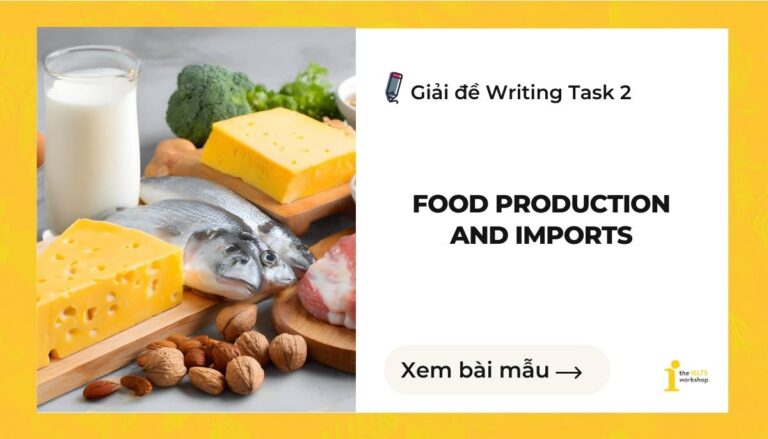Trong chuyên mục Giải đề IELTS Writing Task 2 tuần này, cô Thảo Chi từ The IELTS Workshop sẽ cùng bạn khám phá chủ đề Food production and imports nhé!
1. Phân tích đề bài
1.1. Đề bài
Countries should produce the food that their population eats, and import as little as possible. To what extent do you agree or disagree?
(Các quốc gia nên tự sản xuất lương thực mà người dân tiêu thụ, và nhập khẩu càng ít càng tốt. Bạn đồng ý hay không đồng ý với quan điểm này ở mức độ nào?)
1.2. Phân tích đề bài
Dạng bài: Opinion essay
You need to discuss whether you agree or disagree with the idea that countries should rely mostly on domestic food production and minimize imports.
Xem thêm: Cách làm dạng Opinion essay IELTS Writing task 2
1.3. Dàn bài chi tiết
Introduction
- Paraphrase the statement.
- State thesis: while local food production has advantages, it is neither realistic nor beneficial to completely minimize imports → disagree to some extent.
Body Paragraph 1 – Advantages of producing local food
- Food security: countries become less dependent on foreign suppliers, especially during crises.
- Support local farmers: creates jobs, sustains rural economies, preserves traditional farming.
- Lower environmental footprint: less transport → reduced carbon emissions.
- Example: during global supply chain disruptions, countries with strong local agriculture fared better.
Body Paragraph 2 – Limitations of relying only on local food
- Climate and geography constraints: some regions cannot grow certain crops (e.g., tropical fruits in cold countries).
- Economic inefficiency: producing food that is not naturally suited to the environment may cost more resources (land, water, energy).
- Dietary variety: imports provide consumers with more choices and nutritional diversity.
- Example: many European countries rely on imported rice, bananas, or coffee.
Conclusion
- Restate both sides.
- Final opinion: producing local food is important, but imports remain essential for variety, efficiency, and balance.
2. Bài mẫu
Some argue that nations should aim to produce all the food required for their citizens while minimizing reliance on imports. Although this approach offers certain benefits, I believe it is unrealistic and potentially counterproductive to eliminate food imports altogether.
On the one hand, producing food locally can enhance national resilience. Countries that grow their own staples are less vulnerable to international crises or supply chain disruptions in global trade. For example, during recent supply chain breakdowns, nations with strong domestic agricultural sectors were able to maintain food security more effectively. Moreover, supporting local farmers helps sustain rural economies and safeguard agricultural traditions. In addition, sourcing food domestically reduces the need for long-distance transportation, thereby lowering greenhouse gas emissions and contributing positively to environmental sustainability.
On the other hand, relying exclusively on domestic food production has clear limitations. Climatic and geographical conditions mean that no country can produce every type of food efficiently. Attempting to cultivate crops that are not suited to local environments may require excessive use of land, water, or artificial heating, leading to environmental damage and higher costs. Furthermore, imports provide consumers with a wider variety of food choices, which is crucial for both enjoyment and nutritional diversity. European countries, for instance, import bananas, coffee, and rice—products that cannot be grown locally at scale.
In conclusion, while it is important for countries to cultivate as much food as possible for their populations, imports remain indispensable. A mixture of local production and selective imports offers the most practical and sustainable solution for global resilience.
Sample by Dinh Thao Chi– IELTS Teacher at The IELTS Workshop
3. Vocabulary and collocations
- food security – an ninh lương thực
- supply chain disruptions – gián đoạn chuỗi cung ứng
- sustain rural economies – duy trì nền kinh tế nông thôn
- greenhouse gas emissions – khí thải nhà kính
- geographical constraints – hạn chế về địa lý
- nutritional diversity – sự đa dạng dinh dưỡng
- global resilience – khả năng chống chịu toàn cầu
- counterproductive – phản tác dụng
Xem thêm: Cách học từ vựng IELTS hiệu quả từ thầy Đặng Trần Tùng 9.0
Tạm kết
Mong rằng bài viết mẫu trên đã mang đến cho bạn một góc nhìn toàn diện và cách triển khai mạch lạc cho dạng bài Opinion essay trong IELTS Writing Task 2 với chủ đề Food Production and Imports.
Đừng quên theo dõi chuyên mục [Cập nhật liên tục] Tổng hợp đề thi IELTS Writing 2025 kèm bài mẫu và Bài mẫu Writing Task 2 để củng cố thêm kiến thức và kỹ năng xử lý dạng bài này
Đăng ký ngay HỌC IELTS MIỄN PHÍ tại Website của The IELTS Workshop để luyện tập cùng các giáo viên giàu kinh nghiệm và nhận được hướng dẫn cụ thể hơn nhé!









